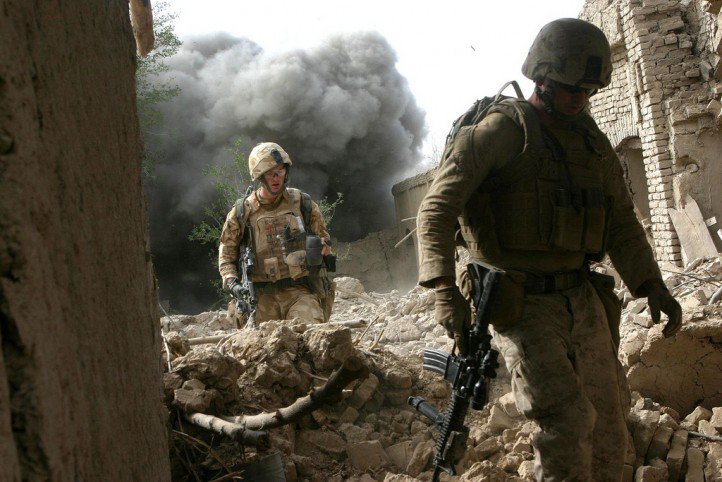Efter en stribe af forskellige forklaringer og undskyldninger - fire forskellige udredninger om hændelsen over de fire første dage, ifølge tælling af The Guardian — så har USA stadigvæk ikke givet en konkret forklaring på hvorfor og hvordan hospitalet blev ramt, dræbende 22 læger og patienter. Det var det værste angreb på et af Læger uden Grænsers hospitaler nogensinde i de 44 år som de har opereret.
Men det var ikke så meget anderledes fra andre amerikanske angreb i den seneste tid på civil infrastruktur. Siden så langt tilbage som 1991, så har USA "ved uheld" sprængt lægevidenskabelige og humanitære faciliteter i luften i en række af steder, resulterende i høje civile dødstal og andet "indirekte skade."
For blot at nævne nogle få tilfælde, i 1991 sigtede USA mod et beskyttelsesrum i Baghdad, dræbende 408 civile irakere. (En amerikansk general påstod at beskyttelsesrummet var "et aktivt kommando og kontrol center.") I 1998 angreb Clinton regeringen Al Shifa farmaceutiske fabrik i Sudan, hvilken USA påstod var forbundet med bin Laden netværket og var involveret i produktionen af materialer for kemiske våben." Som følge deraf, ifølge The Intercept, "har titusinder af mennesker siden dengang lidt og er døde fra behandlelige sygdomme i landet. I 2001, angreb USA et bygningskompleks hvor den international kommittee for det Røde Kors havde til huse i Kabul - ikke én gang men to gange, ødelæggende lagervarehuse som opbevarede mad og forsyninger til flygtninge.
Hændelsen i Kunduz, uheldigvis, er bare en til på listen.
Kommentar: Denne artikel er blot delvis oversat til dansk af sott.net fra:
US stonewalling investigation into bombing of hospital in Afghanistan
While past incidents have often failed to elicit serious calls for accountability, Doctors Without Borders — also known by its French name, Médecins Sans Frontières, or MSF — responded with an outraged press release demanding an independent, impartial investigation of the incident. Appalled by the lack of responsibility taken by either the Afghan or U.S. government, MSF characterized the strike as an attack on the Geneva Conventions. "This cannot be tolerated," the statement explained. "These Conventions govern the rules of war and were established to protect civilians in conflicts — including patients, medical workers, and facilities. They bring some humanity into what is otherwise an inhumane situation."
So far, the United States is refusing to comply with MSF's request for an independent, impartial investigation and instead is carrying out three investigations of its own conducted by the Department of Defense.
Any properly independent inquiry will have to accommodate a variety of egregious facts.
The hospital's GPS coordinates, for instance, were known by both the U.S. and Afghan governments. Even after panicked MSF doctors phoned the authorities amid the strikes to alert them that they were attacking a hospital, the bombing continued for another 30 minutes. The hospital treated victims regardless of their political affiliation or religion, giving lie to any insinuation by the U.S. military or Afghan authorities that the location was friendly to the Taliban or Al Qaeda.
Add to that list: After the attack, a U.S. military tank forced its way into the destroyed hospital. The tank was allegedly carrying U.S., Afghan, and NATO investigators, but it may have destroyed evidence crucial to the investigation.
Without pressure from the public — including mainstream journalists — the United States won't have much difficulty ignoring the controversies of this incident. That's why MSF itself is rallying supporters to keep up the pressure for an independent investigation. The group's website currently features a sign-on petition calling on the Obama administration to allow "a truly impartial truth-seeking investigation."
Since the attack, Pentagon Press Secretary Peter Cook has made clear the U.S. will "work with those affected to determine appropriate payments," but still hasn't agreed to an independent, impartial investigation. Meanwhile, with the MSF hospital in Kunduz out of service, there's no center anywhere in the region that can provide emergency medical attention for victims of the conflict.
In a grim addendum, the Obama administration recently announced that 9,800 U.S. troops will remain in Afghanistan for another year because "Afghan forces are still not as strong as they need to be... and in some places there is risk of deterioration."
Oh the irony.




Kommentar: How can the US government justify bombing an independent hospital that treats victims of war on all sides? They can't, so instead they will stonewall. There is no good reason for the US to refuse an independent investigation, other than it will reveal that they knowingly bombed innocent people, in a hospital no less. The only description one can give to such behavior is evil.